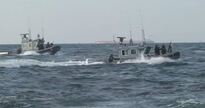26 sept 2019
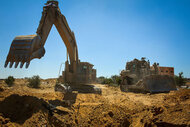
The Israeli occupation authorities announced today the seizure of about 1500 dunums of land in the town of Dura, south of the southern West Bank city of Hebron, enforcing a decision issued in 1987 to seize three plots of Dura land under the pretext they were state-owned.
The seized plots are inhabited and hundreds of residential and agricultural establishments are built on them. Part of the land is also planted with olive trees and almonds and is located within the boundaries of the Dura municipality.
Salah Shalaldeh, member of the legal department at the Anti-Wall, Anti-Settlements Commission, told WAFA that the land was considered state-owned by a military order, and on July 31 the Israeli military authorities decided to look into seizing this land.
He said his commission and the Palestinian liaison office met with the owners of the land and establishments to discuss what is required to file objections to the seizure order. He said part of the land falls within areas classified as B, which is administered by the Palestinian Authority, and owners have land deeds proving their ownership of the land in question.
The seized plots are inhabited and hundreds of residential and agricultural establishments are built on them. Part of the land is also planted with olive trees and almonds and is located within the boundaries of the Dura municipality.
Salah Shalaldeh, member of the legal department at the Anti-Wall, Anti-Settlements Commission, told WAFA that the land was considered state-owned by a military order, and on July 31 the Israeli military authorities decided to look into seizing this land.
He said his commission and the Palestinian liaison office met with the owners of the land and establishments to discuss what is required to file objections to the seizure order. He said part of the land falls within areas classified as B, which is administered by the Palestinian Authority, and owners have land deeds proving their ownership of the land in question.
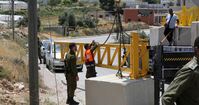
The Israeli occupation forces (IOF) set up an iron gate at the entrance of a separate wall near the Barta’a checkpoint in southern Jenin.
According to local sources, the gate is intended to prevent famers from reaching their olive groves.
There are hundreds of permanent and makeshift IOF checkpoints across the West Bank, which isolates Palestinian cities and towns from each other and obstructs the movement of local residents.
According to local sources, the gate is intended to prevent famers from reaching their olive groves.
There are hundreds of permanent and makeshift IOF checkpoints across the West Bank, which isolates Palestinian cities and towns from each other and obstructs the movement of local residents.
25 sept 2019
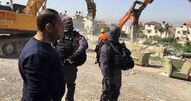
Israeli occupation forces on Wednesday demolished two Palestinian facilities in the West Bank city of al-Khalil.
Local sources said that Israeli bulldozers knocked down a Palestinian structure used to store agricultural equipment in Sahl al-Baq'a area in al-Khalil City.
In the same city in al-Hajra area Israeli bulldozers demolished a two-floor Palestinian home for allegedly being unlicensed.
Local sources said that Israeli bulldozers knocked down a Palestinian structure used to store agricultural equipment in Sahl al-Baq'a area in al-Khalil City.
In the same city in al-Hajra area Israeli bulldozers demolished a two-floor Palestinian home for allegedly being unlicensed.
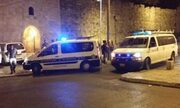
Israeli police, today, ordered a Palestinian butchery located in East Jerusalem to shut down for 15 days, for hiring Palestinian help, according to the shop owner Fadi Zahdeh.
He told WAFA that police raided his shop in Silwan, took him to their station where he was questioned about hiring a Palestinian resident of the West Bank who did not have a permit to be in Jerusalem.
He said police told him that his shop will be closed for 15 days, as a punishment for hiring the Palestinian and that he will be arrested if he opens it during this period.
He told WAFA that police raided his shop in Silwan, took him to their station where he was questioned about hiring a Palestinian resident of the West Bank who did not have a permit to be in Jerusalem.
He said police told him that his shop will be closed for 15 days, as a punishment for hiring the Palestinian and that he will be arrested if he opens it during this period.
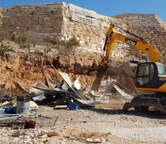
Israeli soldiers demolished, Wednesday, a shed and an agricultural structure in Deir Ballout town, west of the central West Bank city of Salfit.
The soldiers surrounded the entire area before invading it and demolished the two structures without prior notice.
Salfit Governor, Lieutenant Dr. Abdullah Kamil, denounced the ongoing and escalating Israeli violations against the residents in Salfit, including the repeated bulldozing and uprooting of farmlands, and the destruction of property.
He called on various international human rights and legal groups to intervene, and stop the Israeli violations against the Palestinian people, and added that “such crimes requires serious international intervention, especially since the silence and idleness of the international community are encouraging Israel to continue and escalate its crimes.”
It is worth mentioning that the soldiers also demolished an agricultural room, and a water tank, east of Hebron.
The soldiers surrounded the entire area before invading it and demolished the two structures without prior notice.
Salfit Governor, Lieutenant Dr. Abdullah Kamil, denounced the ongoing and escalating Israeli violations against the residents in Salfit, including the repeated bulldozing and uprooting of farmlands, and the destruction of property.
He called on various international human rights and legal groups to intervene, and stop the Israeli violations against the Palestinian people, and added that “such crimes requires serious international intervention, especially since the silence and idleness of the international community are encouraging Israel to continue and escalate its crimes.”
It is worth mentioning that the soldiers also demolished an agricultural room, and a water tank, east of Hebron.
24 sept 2019
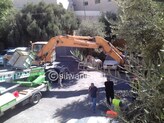
Many Israeli army jeeps and bulldozers invaded, on Tuesday morning, Ras al-‘Ein neighborhood, in Silwan town, south of occupied East Jerusalem, and demolished for stables for horses.
The Wadi Hilweh Information Center in Silwan (Silwanic) said the soldiers, accompanied by personnel of the Engineering Department of the City Council in occupied Jerusalem, surrounded Ras al-‘Ein neighborhood, before invading it.
Silwanic added that the soldiers then isolated the area around four stables, owned by Na’im Roweidi, and demolished them.
The Palestinian installed the stables several years ago and was using them to provide shelter for his horses, and to store their fodder. video
In related news, the soldiers confiscated a Palestinian car in the ar-Ras al-Ahmar area, in northern Jordan Valley, without providing and cause of justification.
The Wadi Hilweh Information Center in Silwan (Silwanic) said the soldiers, accompanied by personnel of the Engineering Department of the City Council in occupied Jerusalem, surrounded Ras al-‘Ein neighborhood, before invading it.
Silwanic added that the soldiers then isolated the area around four stables, owned by Na’im Roweidi, and demolished them.
The Palestinian installed the stables several years ago and was using them to provide shelter for his horses, and to store their fodder. video
In related news, the soldiers confiscated a Palestinian car in the ar-Ras al-Ahmar area, in northern Jordan Valley, without providing and cause of justification.
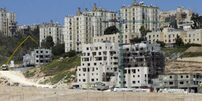
The Wall and Settlement Resistance Committee unveiled on Tuesday a detailed settlement plan aimed at seizing more land in the village of Naqoura north of Nablus.
The plan reportedly aims to expand the settlement of Shavei Shomron by diverting agricultural land adjacent to the settlement from basin (12) of Naqoura village for the use in construction and annexation of its borders for settlement purposes.
Head of the settlement file in the northern West Bank, Ghassan Daghlas, told WAFA that what is being talked about is an expansion project for the structural plan of the settlement, which was built on the lands of Sebastia, Naqoura and Burqa, adding that this project threatens to seize more land.
Daghlas said that there is an expansion of the settlement plans in the vicinity of Nablus at the expense of the citizens’ lands.
The plan reportedly aims to expand the settlement of Shavei Shomron by diverting agricultural land adjacent to the settlement from basin (12) of Naqoura village for the use in construction and annexation of its borders for settlement purposes.
Head of the settlement file in the northern West Bank, Ghassan Daghlas, told WAFA that what is being talked about is an expansion project for the structural plan of the settlement, which was built on the lands of Sebastia, Naqoura and Burqa, adding that this project threatens to seize more land.
Daghlas said that there is an expansion of the settlement plans in the vicinity of Nablus at the expense of the citizens’ lands.
23 sept 2019
He pointed out that about 50 percent of basic medicines and about 60 percent of medical consumables became completely out of stock in public hospitals, laboratories and blood banks.
22 sept 2019
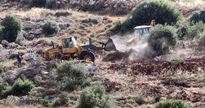
Jewish settlers from the illegal settlement of Adei Ad bulldozed on Sunday a vast tract of Palestinian-owned agricultural land in Turmus Ayya town, north of Ramallah in the occupied West Bank.
Turmus Ayya mayor Rifaat Lavi said that Adei Ad settlers embarked on bulldozing about six dunums of agricultural land belonging to the family of Abu Kafya.
This was the fourth time in two months the same settlers had carried out bulldozing activities in the town, mayor Lavi pointed out, adding that such practices take place under military protection.
Turmus Ayya mayor Rifaat Lavi said that Adei Ad settlers embarked on bulldozing about six dunums of agricultural land belonging to the family of Abu Kafya.
This was the fourth time in two months the same settlers had carried out bulldozing activities in the town, mayor Lavi pointed out, adding that such practices take place under military protection.
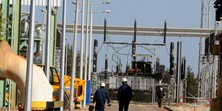
Minister of Health, Mai Alkaila, warned late yesterday that a possible power outage, expected to be initiated by Israel, in the West Bank governorates of Ramallah and Bethlehem may put the lives of dozens of patients at risk, as such outage may cause damage to refrigerated medications.
Last week, the Palestinian-owned Jerusalem District Electricity Company (JDECO) said it received a third warning from the Israeli Electricity Company (IEC) informing it that it will start rationing or cutting electricity supply to some of the company's concession areas on the 22nd of this month from 10 am to 12 noon local time in the cities and districts of Ramallah and Bethlehem, and on the 23rd from 12 noon until 2:00 p.m. on parts of Ramallah and Jericho and their area villages.
Alkaila said such blackout may also cause harm to a large segment of the population in these governorates, as it affects the validity of hundreds of products and food parcels that require refrigeration or freezing.
In addition, she added, the power outage “may affect medications and vaccines kept in the refrigerators of the health centers and health care clinics.”
“Any power outage on the refrigerators and vaccines of the health centers will damage them and affect their effectiveness, especially those medicines kept at low temperatures. Some of them require permanent freezing during the storing period,” Alkaila continued.
She said any power outage by IEC will certainly affect the validity of children’s vaccines, “as most vaccines are stored at temperatures between 2-8°C, and there are a number of vaccines that need freezing at temperatures as low as minus 20°C, such as the polio vaccine.”
“One of the most important factors in responding to the effectiveness of vaccines is the cold chain of storing them. This means that administering vaccines that have not been kept in proper temperature will result in them being useless,” the Health Minister emphasized.
She pointed out that JDECO has exerted great efforts to ensure the provision of electricity to the health centers in the cities, but that does not apply to all health centers, as JDECO will not be able to provide all health centers with electricity as a result of the Israeli blackout. “This threatens the lives of all patients who use the services of those centers, especially those of the serious cases.”
Alkaila stressed that the power outage will not only affect patients and medicines, but also goes beyond to refrigerators at homes, shops and shopping malls. “Such outage means that food items that need to be kept at low temperatures are at risk of deterioration.”
Last week, the Palestinian-owned Jerusalem District Electricity Company (JDECO) said it received a third warning from the Israeli Electricity Company (IEC) informing it that it will start rationing or cutting electricity supply to some of the company's concession areas on the 22nd of this month from 10 am to 12 noon local time in the cities and districts of Ramallah and Bethlehem, and on the 23rd from 12 noon until 2:00 p.m. on parts of Ramallah and Jericho and their area villages.
Alkaila said such blackout may also cause harm to a large segment of the population in these governorates, as it affects the validity of hundreds of products and food parcels that require refrigeration or freezing.
In addition, she added, the power outage “may affect medications and vaccines kept in the refrigerators of the health centers and health care clinics.”
“Any power outage on the refrigerators and vaccines of the health centers will damage them and affect their effectiveness, especially those medicines kept at low temperatures. Some of them require permanent freezing during the storing period,” Alkaila continued.
She said any power outage by IEC will certainly affect the validity of children’s vaccines, “as most vaccines are stored at temperatures between 2-8°C, and there are a number of vaccines that need freezing at temperatures as low as minus 20°C, such as the polio vaccine.”
“One of the most important factors in responding to the effectiveness of vaccines is the cold chain of storing them. This means that administering vaccines that have not been kept in proper temperature will result in them being useless,” the Health Minister emphasized.
She pointed out that JDECO has exerted great efforts to ensure the provision of electricity to the health centers in the cities, but that does not apply to all health centers, as JDECO will not be able to provide all health centers with electricity as a result of the Israeli blackout. “This threatens the lives of all patients who use the services of those centers, especially those of the serious cases.”
Alkaila stressed that the power outage will not only affect patients and medicines, but also goes beyond to refrigerators at homes, shops and shopping malls. “Such outage means that food items that need to be kept at low temperatures are at risk of deterioration.”
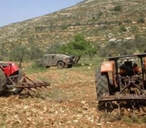
Israeli soldiers prevented, on Saturday evening, a Palestinian farmer from plowing and working on his own land, and confiscated a bulldozer working on the land, in the al-Mintar area, in Kafr Thulth town, south of the northern West Bank city of Qalqilia.
Hosni Odah, the mayor of Kafr Thulth, said the soldiers confiscated a bulldozer, owned by Ayman Ahmad Mara’ba, who was working on lands owned by Abdul-Latif Hasan Arar, who hired him to do the job.
Odah added that the soldiers forced the Palestinians out of the land, and closed with sand hills the agricultural road linking between Azzoun and Kafr Thulth and leading to al-‘Oyoun area in Wadi Qana.
It is worth mentioning that the road was recently opened to provide the Palestinian farmers an easier access route to their farmlands and orchards.
Hosni Odah, the mayor of Kafr Thulth, said the soldiers confiscated a bulldozer, owned by Ayman Ahmad Mara’ba, who was working on lands owned by Abdul-Latif Hasan Arar, who hired him to do the job.
Odah added that the soldiers forced the Palestinians out of the land, and closed with sand hills the agricultural road linking between Azzoun and Kafr Thulth and leading to al-‘Oyoun area in Wadi Qana.
It is worth mentioning that the road was recently opened to provide the Palestinian farmers an easier access route to their farmlands and orchards.
21 sept 2019
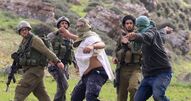
One Palestinian citizen suffered a head injury and three cars sustained damage on Friday when a horde of extremist Jewish settlers attacked local farmers in the occupied West Bank.
According to local sources, about 25 settlers, escorted by soldiers, hurled stones at Palestinian farmers from Beitin town in Ramallah during their presence in their agricultural fields in the nearby town of Burqa.
One citizen identified as Sayel Derweesh suffered a head injury during the attack and three vehicles belonging to others from Beitin town sustained material damage.
According to local sources, about 25 settlers, escorted by soldiers, hurled stones at Palestinian farmers from Beitin town in Ramallah during their presence in their agricultural fields in the nearby town of Burqa.
One citizen identified as Sayel Derweesh suffered a head injury during the attack and three vehicles belonging to others from Beitin town sustained material damage.
Page: 37 - 36 - 35 - 34 - 33 - 32 - 31 - 30 - 29 - 28 - 27 - 26 - 25 - 24 - 23 - 22 - 21 - 20 - 19 - 18 - 17 - 16

